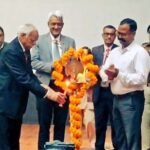Tokyo/ New Delhi, Aug 29 (UNI) Prime Minister Narendra Modi arrived in Japan to attend the 15th annual bilateral meeting with Japanese counterpart Shigeru Ishiba, which is expected to deepen economic and strategic ties. He expressed that he is looking forward to engaging with PM Ishiba as it will provide an opportunity to deepen existing partnerships and explore new avenues of collaboration.
“Landed in Tokyo. As India and Japan continue to strengthen their developmental cooperation, I look forward to engaging with PM Ishiba and others during this visit, providing an opportunity to deepen existing partnerships and explore new avenues of collaboration,” PM Modi stated.
The two-day visit is expected to be pivotal, especially considering the ongoing tensions with the United States over tariff issues. This is Prime Minister Modi’s first meeting with newly elected Japanese Prime Minister Shigeru Ishiba, marking an important chapter in India-Japan relations. It will also be Modi’s eighth visit to Japan, underscoring the enduring leadership-level diplomacy between the two countries.
During the 15th India-Japan Annual Summit, PM Modi will engage with his Japanese counterpart, Shigeru Ishiba, to explore new initiatives for bilateral growth. Nikkei Asia reported that Japan will invest 10 trillion yen (approximately $68 billion) over the next decade to strengthen its business ties with India, with a particular emphasis on sectors such as artificial intelligence, semiconductors, environmental sustainability, and medicine.
Ahead of the summit, PM Modi took to social media to outline the goals of his visit: “We would endeavor to give new wings to our collaboration, expand the scope and ambition of our economic and investment ties, and advance cooperation in new and emerging technologies, including AI and Semiconductors.” This move signals India’s growing role as a strategic partner for Japan in key future industries.
One of the key focal points of the discussions will be the Quad alliance, which includes India, Japan, the United States, and Australia, aimed at promoting security and economic stability in the Indo-Pacific region.
India is in urgent need of rare earth minerals and advanced AI capabilities to secure its technological and economic future, particularly as the rest of the world progresses rapidly in these areas. Rare earths are vital for manufacturing advanced electronics and clean energy technologies, while AI is a cornerstone of modern innovation.
To prevent technological dependence and achieve its strategic goals, India is actively implementing multifaceted strategies to strengthen its position in both fields. The timing of the visit is especially crucial for India, which has been working to expand its global outreach in response to recent unilateral US tariffs. The summit is seen as an opportunity for both countries to deepen their collaboration in areas that drive economic security, technological innovation, clean energy, and people-centric development.
With growing cooperation across a variety of sectors—from defence and infrastructure to space and technology—the India-Japan Special Strategic and Global Partnership continues to increase in importance, fostering regional stability, economic growth, and innovation. India and Japan have shared this partnership since 2014, built on deep civilisational ties and a common vision for regional and global issues. Both nations’ approaches to the Indo-Pacific—India’s Act East Policy and Indo-Pacific Oceans Initiative (IPOI) and Japan’s Free and Open Indo-Pacific (FOIP)—align closely, further strengthening cooperation across a range of areas.
This collaboration encompasses enhancing connectivity and infrastructure through initiatives like the Asia-Africa Growth Corridor (AAGC) and supporting the Indo-Pacific Oceans Initiative (IPOI), as well as coordinating the Quadrilateral Security Dialogue (Quad). Key areas of cooperation include economic development and supply chain resilience.
During the summit, Prime Ministers Modi and Ishiba are expected to discuss ways to further enhance their economic ties, particularly in securing stable supply chains for critical goods. A new framework is expected to be signed, focusing on emerging technologies such as semiconductors, AI, and pharmaceuticals.
In addition to the summit, Prime Minister Modi is slated to visit Sendai, a city in Northeast Japan renowned for its cutting-edge semiconductor research and development.
The visit also highlights India’s growing interest in strengthening technology ties with Japan. Modi is also expected to invite Prime Minister Ishiba to an international AI conference in India scheduled for February next year. Both leaders will explore opportunities for global cooperation in shaping international rules to govern AI development, ensuring the technology remains safe, ethical, and trustworthy.
Beyond technology and economic collaboration, both sides will deliberate on key regional issues such as Indo-Pacific security, climate change, and economic stability. Japan, being a crucial player in the G7 and Quad, plays an important role in supporting India’s push for a rules-based order in the Indo-Pacific.
India and Japan’s cooperation extends beyond bilateral discussions into several multilateral platforms, including the Quad, the International Solar Alliance (ISA), the Coalition for Disaster Resilient Infrastructure (CDRI), and the Supply Chain Resilience Initiative (SCRI). Japan remains a crucial partner in the IPOI’s connectivity pillar and continues to be India’s largest official development assistance (ODA) donor, supporting a wide range of critical infrastructure projects.
Bilateral trade between India and Japan reached USD 22.8 billion in 2023–24. India imports machinery, steel, reactors, and copper from Japan, while it exports chemicals, vehicles, aluminium, and seafood. Japan is India’s fifth-largest source of Foreign Direct Investment (FDI), with cumulative investments amounting to USD 43.2 billion by December 2024.
PM Modi arrives in Japan for 15th Annual bilateral summit with PM Shigeru Ishiba











